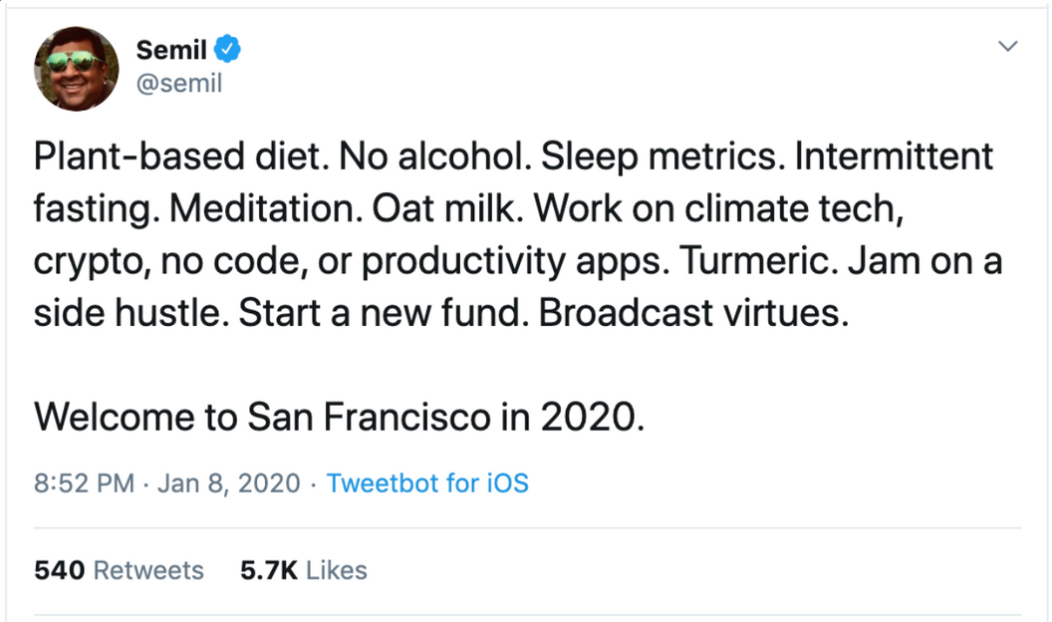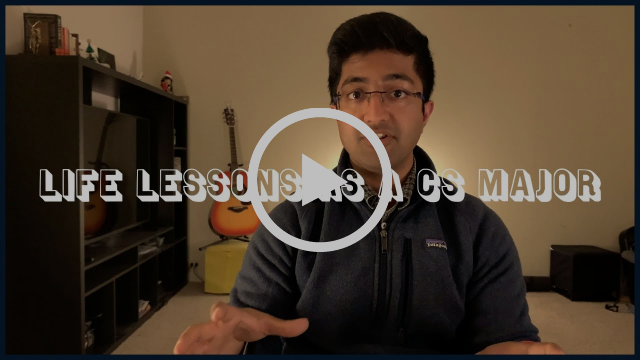Why be productive when you can choose not to
Hi friends,
This week, I want to leave some food for thought about how (or if) lifestyle habits and routines have the potential to define your approach toward other things, thereby impacting your life in exponentially more meaningful ways.
One quote particularly struck me. It read: "How you do anything is how you do everything."
Let's hold that quote for a second, but now, read this:

Now, if you know, you know (in which case, skip the next two paragraphs.) But if you don't, let me explain.
As for the quote, I find it both self-explanatory and relevant. Your approach toward anything can be examined by your approach toward, again, anything. For example, if one is extravagant in one sphere of life, chances are they're also spendthrift in another area of life. Opposing qualities cannot exist in the same individual. Hence, the classical nails-length check for any interview.
As for the tweet, it's a light jab at the classical Bay Area startup entrepreneur and the archetypal Google software engineer. If you have met anyone from the Bay Area, chances are they would have (read 'be guilty of') at least three of these qualities.
Now, I was on the fence about the quote. At first, I could not come to terms with it. I thought I could easily choose to do specific things in way X and other things in way Y. For example, I could choose to approach my projects and assignments in a structured, focused manner, but run errands in a highly time-ineffective manner. How could it ever matter? Soon, I realized that it did. When I chanced upon the tweet, I realized I was not guilty on three, but rather eight counts, for not only do I track my sleep and workouts, I also don't have alcohol and tend to focus on productivity.
My concern, then, was whether living life in a highly-systematized, organized manner really mattered or not.
I don't have an answer to that, and as always, there can never be a "right" answer. But I do know that these woke Silicon Valley concepts align with few of my core direction-setting principles, and thus, I would continue being guilty of them, provided I continue enjoying the journey as well and am not the person in this video.
As parting thoughts, here are some questions for you:
- What are your core principles?
- How can you concretize and work on your core principles?
- Do you expect your lifestyle habits to result in an exponential change? If so, why? If not, why?
- What is the road toward "success" made of?
Have a great week ahead!
Abhinav
Video of The Week

In this video, I share two simple lessons I learned from my time as a computer science major at UC Berkeley:
1) A Greedy Algorithm Is Not Always Optimal.
2) You Will Never Know Everything.
Podcasts of The Week
In this episode, we reflect on several ideas: the qualities of great teachers; why it's important for a teacher to relate to students; the distinction between and confluence of a mentor, teacher, and coach; and how teachers bring out the best in students. We mention Richard Feynman, his modern-day equivalent for Abhinav, and share how our teachers have inspired us over the years.
Article of The Week
Progressive Summarization: A Practical Guide for Discoverable Notes
This article on was an insightful one. I learned about how to internalize, process and summarize new information as and when I come across it. I highly recommend reading Tiago Forte's work on building a foolproof productivity system for yourself.
App of The Week
If you're a student at UC Berkeley or someone who's exploring some cool tech, then definitely read ahead. Three friends of mine developed this beautiful iOS app, Iris, which is the Super-Assistant of all assistants.
Here's a message from the team:
The product’s called Iris, your personal super assistant. Current “personal assistants” like Alexa are good at generalizing info (i.e. reading the news and playing songs), but there’s nothing really “personal” about them. Me using my Alexa is the same as someone else using my Alexa.
We think about personal assistance differently — Iris gives you information that pertains to your needs and your preferences as a Berkeley student. Whether it’s knowing if your walk home is safe at night, what deals there are at Cheese ’n Stuff, when you need to pull the stop cord on the bus to get off, how busy your favorite study spots are, or the best concert prices based on your favorite artists, Iris is entirely focused around you!
Each little “page” on Iris (called cards) works in tandem with all the other pages; not only will you know whether Cafe Strada is full and how many outlets there are, you also get to know whether or not it’s going to rain on your walk there so you know to bring an umbrella; or if there’s police activity near your walk home, you can call an Uber/Lyft in one tap. Cards learn from each other to make your experience as optimized as possible.
We know that not every card is meant for everyone—you can choose only the cards that best suit your needs and tailor the app to your daily routine!
And here’s the real kicker: all of your data/preferences never even touch our servers. All your data is stored entirely on your own phone, so if you delete the app, it disappears forever. We believe your data should be entirely yours, always.
Right now Iris is only available for iOS and we’re starting with a pack of 7 “cards”. I’d love for you to check it out (and give a review on the app store). we’re looking forward to expanding this soon and making it as amazing as possible. Thanks!!
----
Click here to download the app.